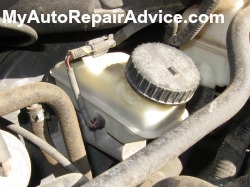Low Brake Fluid
Are you having low brake fluid problems? Learn what causes it and how to find a brake fluid leak with advice from an experienced mechanic.
First off, let me stress this is a problem that shouldn't be ignored. If the fluid in your brake master cylinder reservoir gets too low, it can cause your brakes to not work at all.
The reason that your brake pedal gets hard and stops the car or truck when you step on it is because the brake fluid is being pushed through the braking system to the brake caliper and pads, which then stops the car. If there is not enough fluid in the system then this will not happen. Let's take a look at some of the common causes and what to do about them.
Low Brake Fluid Causes

If you find that your brake fluid is low then there are two things you'll need to know.
The first thing is that as your brake pads wear out, the caliper piston will be gradually pushed out of its housing. This keeps it right next to the brake pads so the pads will contact the brake rotor very quickly when the pedal is pushed. The result of this is that the fluid level will go down slightly over time (it is being used to fill the braking system).
Whenever you replace your brake pads, be sure to top up your brake fluid all the way to the full mark. As your pads wear the fluid level will get down closer to the "low" mark. If it has been a long time since your last brake job then you might have low brake fluid simply because it is being used in your braking system. This is one of the common causes of low brake fluid levels.
The second most common cause of low brake fluid is a leak. A brake fluid leak is a much more serious concern.
If you don't find out where it is leaking and fix the problem, then you could end up running the brake system dry. The end result is this: When you step on the brakes, the pedal will go all the way to the floor but it will not stop the car. Brake fluid leaks are not something to "worry about later". The safety of you and whoever else rides in your car is at stake. Next, I'll show you what are the brake fluid leak symptoms.
How to Find a Brake Fluid Leak
One of the first things to do is to look at the driveway where you usually park your vehicle. See if there is any fluid puddles. You will be looking for a clear fluid (if it is really old then it might have a brown tint) that will feel oily on your skin.
If you don't see anything the next thing to do is to inspect under the car around the wheels. If there are any leaks near the wheels you should be able to find a wet spot. Be sure to look at the bleeder valve on the calipers and all the flexible brake hoses near the wheels. These hoses are common causes of leaks.
If you have drum brakes, then you will also need to inspect the brake wheel cylinders. These are small round cylinders that have pistons in them that push out and expand the brake shoes to contact the drums and stop the car or truck. Many times you will find that the seals have dried out and caused a leak.
One more area to inspect is around the brake master cylinder. The master cylinder is a common area to find leaks. Be sure to look where the master cylinder meets the firewall, look for bubbling or peeling paint. Since brake fluid will eat away paint it will be easy to see if this is where the leak is. Also, be sure to look inside the vehicle under the dash at the top of the brake pedal. This is another common place for it to leak.
A great way to help you find this leak is to start the vehicle and press on the brake pedal slowly. As the pedal goes down it should come to a stop. If it does not then you know you have brake fluid leaking out somewhere. Do this a few times, then go look under the vehicle and around the brake master cylinder. This will ensure that there is fresh brake fluid around the leak so it will be easier to see.
How to Fix Brake Fluid Leaks
After you have found your cause of low brake fluid level, you need to determine whether you can fix it yourself or whether you need to take it to a mechanic.
If you know how to bleed the brakes, then you should be able to tackle most brake problems yourself. If you aren't good with brakes and don't know how to bleed brakes then you probably should take it to a mechanic. If you choose that route, be sure to read my article on brake repair scams so you know how to protect yourself from rip offs.
If you still have any unresolved vehicle problems or questions, you can ask an auto mechanic online. For expert answers specific to your vehicle's make and model, I recommend JustAnswer Car. They have a large pool of certified mechanics to answer your questions for a small fee and you can also browse their answers to other users for free.
Recommended Tools and Parts for Adding Brake Fluid
Brake Fluid: Click here to find one for your vehicle make and model
Funnel: Hopkins Multi-Purpose Funnel
Testing Strip: Phoenix Systems BrakeStrip
Disposable Towels: Scott Shop Towels
BRAKE FLUID
New! Comments
Have your say about what you just read! Leave me a comment in the box below.